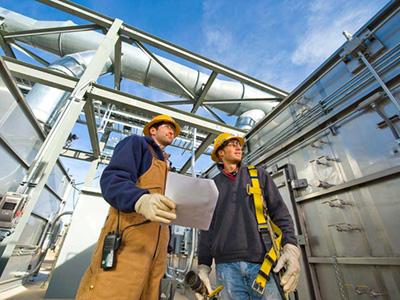Making the World Cleaner, Safer, and More Secure
By: Fred deSousa

For more than 40 years, we have partnered with industry, academia, and allied governments to make the world a cleaner, safer, and more secure place. We have performed environmental cleanup work at more than 500 contaminated sites across the world, managed operations at vital national security projects, and helped the U.S. and other countries reduce threats posed by weapons of mass destruction. Their results will benefit people and the environment for centuries to come.
Pueblo Chemical Agent-Destruction Pilot Plant, Colorado
The Pueblo Chemical Agent-Destruction Pilot Plant (PCAPP) is a state-of-the-art facility currently safely and efficiently destroying the chemical weapons stockpile stored at the U.S. Army Pueblo Chemical Depot near Pueblo, Colorado. In 2018, we helped PCAPP deliver on its mission with end-to-end facility operations to ensure the plant is operating as designed – the final step before the plant will be declared fully operational. As of May 2019, the Pueblo facility safely eliminated more than 132,000 munitions. Combined with the Explosive Destruction System operations, PCAPP has destroyed more than 774 tons (702 tonnes) of deadly chemical weapons.
Saltstone Disposal Unit 6, South Carolina
As a member company of Savannah River Remediation, LLC, we helped the U.S. Department of Energy deliver Saltstone Disposal Unit 6 (SDU6), a first-of-its-kind, 32-million-gallon (124-million-liter) tank and the largest rubber-lined tank in the world. SDU6 was created to safely store treated, low-level radioactive waste from 43 underground waste tanks at the Savannah River Site in Aiken, South Carolina. Three additional tanks similar to SDU-6 are now under construction.
Uranium Processing Facility, Tennessee
The Uranium Processing Facility (UPF) is a state-of-the-art complex for enriched uranium operations being constructed at the Y-12 National Security Complex. The UPF will replace World War II era facilities to help ensure the long-term viability, safety, and security of the nation’s enriched uranium capabilities; support the U.S. nuclear weapons stockpile; prevent proliferation of weapons-grade uranium; and supply fuel for U.S. Navy submarines and aircraft carriers. In 2018, Consolidated Nuclear Security, LLC, a Bechtel-led company, began construction on the UPF. The work includes the Main Processing Building for high-risk nuclear materials, the Salvage and Accountability Building for low-risk nuclear materials, and the Mechanical Electrical Building. The new facility will improve worker safety, reduce operational costs, and allow more efficient mission delivery.
The UPF consists of multiple safety-related structures and equipment that must be designed to withstand a severe earth-quake. To determine what was needed required studies propagating seismic waves from a depth of more than 10,000 feet (3,048 meters) to the surface, through the complex geology. This analysis was performed using a first-of-a-kind, very large, two-dimensional site model developed by a team of Bechtel’s earthquake engineering specialists. The analysis was completed successfully and accepted by the U.S. Department of Energy and their reviewers, yielding a defensible design basis for the project. This enabled the project to complete an important component of engineering on schedule, and, more importantly, seeks to ensure that the facility will be safe in the event of an earthquake.
Pile Fuel Cladding Silo, Sellafield Site, UK
From 1952 to 1964, the U.K. disposed of radioactive debris from its early nuclear fuels in a 60-foot (18-meter)-tall silo building with six compartments. As part of Bechtel Cavendish Nuclear Solutions, our team has designed, fabricated, and installed an innovative waste retrieval system using a remote-operated arm and a grapple that will be lowered into each chamber. To assure the waste materials can be handled and removed safely, the compartments are filled with argon gas to minimize risk of a spontaneous fire. The retrieval system must maintain an airtight seal. Once retrieved, the waste will be packaged in robust containers for disposal, addressing a long-term environmental risk in what is described as one of Europe’s most hazardous buildings.
Bechtel has a long history of making the world a safer and cleaner place. Our history would not be a success without having partnered with customers and other entities in the industry who are also committed to global sustainability. In the future, we hope to carry on meaningful partnerships to continuously secure a better world for our customers and the communities in which they live.

